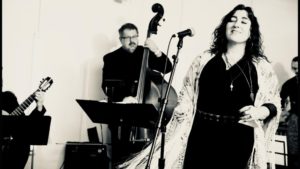KANTUZ is a Basque word that means something like “with the song” or “by song,” and speaks to everything that comes with song—memories, echoes, the life of the music.
We called our album 1931 to invoke that particular time in music and art. The musician-poet Federico García Lorca, who continues to inspire so much, published his book of piano arrangements Ancient Spanish Songs and his defining poetry collection Poem of Deep Song in that year, which was also the year in which he toured the United States with the singer La Argentinita, accompanying her voice on the piano. We like to imagine that some of the songs you’ll hear in this album were played for the first time in these lands by the Spanish poet and his singer friend in those weeks of 1931. Federico García Lorca in many ways embodies the spirit of the modern era and the avant-garde, being as he was a multi-faceted artist with a burning need “to create radically modern versions of the classics.” In naming our album 1931, we aim to echo the legacy and the hope of that fruitful year in the history of modern Spanish music and poetry and, also, to capture some of the spirit of that promising age in Spain and in the United States.
We are once again in the early years of a new millennium. The world has changed a lot in the last 88 years but musicians keep traveling the world, meeting in random cities and inventing new sounds, like they’ve always done. And the classics still need radically modern reinterpretations, like they always will. The four members of Kantuz, all classically trained, each with parallel influences in jazz, flamenco, blues and rock, met in Chicago, magical city of music and renewal, and this album’s offering to you is a sound that owes as much to this city and this age as it does to far-away mountains and times. As much to the urban grit of the gig in the local dive bar as to the shine and shush of the concert hall. It’s music for the ages. It’s always been here. We just keep playing it.
Thank you for listening.
Amaia Gabantxo (voice)
Rafael Vivanco (guitar)
Nils Higdon (percussion & vibraphone)
Mitch Straeffer (double bass)
KANTUZ: 1931 – SONG LIST
1. Invocación + Danza + Fuego Fatuo / Invocation + Dance + Fire Sprite
This piece brings together Joaquín Rodrigo’s homage to M. de Falla (Invocación y Danza) and pairs it with de Falla’s Fuego Fatuo and Lorca’s two poems: “Hora de Estrellas” and “Adivinanza de la guitarra.” We feel all these pieces are related and, also, we like to think that in doing this, we’re having these three friends converse together again, like they did so often in life.
2. Asturiana / From Asturias
From de Falla, rearranged for guitar, double bass, percussion and voice. This is a song about talking to a tree.
3. Pelegrinitos + Canción / The Little Pilgrims + Song
From Lorca and de Falla and the popular flamenco repertoire, rearranged for guitar, double bass, percussion and voice. This is a song about two cousins who walk to Rome to seek permission from the Pope to get married. Both de Falla and Lorca included this song in their songbooks, but they used different lyrics. Lorca’s was all about the journey and the wedding, whereas de Falla’s related how it all eventually went wrong.
4. Nana / Lullaby
From de Falla, rearranged for guitar, double bass, percussion and voice. This is a gorgeous lullaby that compares a baby to the morning star.
5. Jota / Jota (a type of dance)
From de Falla, rearranged for guitar, double bass, percussion and voice. This is a song about two star-crossed lovers who keep meeting despite their families’ opposition to their union.
6. Soleares / Soleares (a type of beat)
Original composition by Joaquín Turina, rearranged for guitar, double bass and percussion.
7. Cardo o Ceniza / Thistle or Ash
Original composition by Chabuca Granda, rearranged for guitar, double bass, percussion, voice and kalimba. This is an erotic song about anticipation, about imagining a lover’s caress before it happens—will it feel like thistle, or ash?
8. Piedra y Camino / Stone and Path
Original composition by Atahualpa Yupanqui, rearranged for guitar, double bass, percussion and voice. This is a song about the beauty and the burden of owning a pilgrim heart.
9. Café de Chinitas + Polo / Little China Café + Polo (a type of beat)
From Lorca and de Falla. This is another instance where we bring these two dear friends together again, this time to talk about bravery and defiance.
10. Tonada de la luna llena / Tune for the Full Moon
Anonymous traditional Venezuelan song collected by Simón Díaz, rearranged for percussion and voice. This is an ancient song about love, death, and the moon that starts with the line, “I watched a heron battle the river / that’s how my heart fell for yours…”
11. Pequeño Vals Vienés / Little Viennese Waltz
Leonard Cohen composed This Waltz to host his translation of Federico García Lorca’s poem Pequeño Vals Vienés. Cohen said it took him 175 days to translate the poem. The musical structure he built for it is so perfect, it fits Lorca’s original poem like a glove.
12. Txori Erresiñula / Nightingale Bird
A traditional Basque song about an elusive nightingale, collected by Josu Okiñena and rearranged for guitar, double bass, percussion, voice and vibraphone by Nils Higdon.


Deje una respuesta